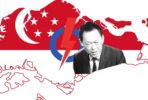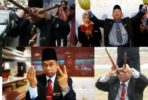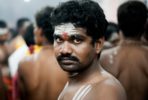When a bomb went off one Sunday night in April 1964 at Jalan Rebong in Kampung Ubi, the impact was so large that I could feel it from my home in Geylang Serai a kilometre away.
A 50-year-old Malay widow and her only child, a 19-year-old schoolgirl, who were at a neighbour’s house were killed when the bomb exploded nearby.
Three days later, another bomb went off about a kilometre away, at the junction of Jalan Betek and Jalan Timun, at a public telephone booth. Five people were injured, including a 62-year-old Chinese woman and three Malays who lived near the booth.
As a 12-year-old boy who had just entered secondary school, I was curious as to why a bomb had gone off in my kampung area.
I cycled to Jalan Betek, the scene of the second explosion, to see the mayhem. Only the concrete base of the phone booth was left; the booth and its roof had been blown to bits. The house next door was in shambles, its sitting room badly damaged.
Months earlier, terrorists had planted a bomb at Katong Park in front of the Ambassador Hotel in Meyer Road. That park by the beach was a favourite picnic site for many of us who lived in Geylang Serai.
The series of bombings in Singapore occurred at the height of Indonesia’s “Konfrontasi” – “Confrontation” – against the Federation of Malaysia formed in September 1963. Singapore was then a part of this federation.
We were told that it was the work of Indonesian soldiers who had infiltrated the island to launch a campaign of terror in line with its “Ganjang Malaysia” – “Crush Malaysia” – campaign against the fledgling federation.
It was an act of military aggression without a formal declaration of war against Malaysia, which then President Sukarno considered a “British puppet”.
For the Malays in my kampung, Konfrontasi was a campaign of terror against civilians. The series of bombings against targets such as telephone booths, public parks and beaches targeted ordinary people.
Soon, people were afraid to visit these places.
The biggest attack was the bombing in March 1965 of MacDonald House in Orchard Road, which killed three civilians and injured 33 others.
Indonesian marines Osman Mohamed Ali and Harun Said were arrested, tried and convicted of murder and hanged.
Konfrontasi was a source of disappointment to my late father, who was Javanese, and his Javanese friends.
They had come to see Sukarno as a leader who had united the sprawling archipelago, and were disappointed that he had launched the campaign of terror against Malaysia, a newly emerging nation in the Nusantara, the Malay world.
Konfrontasi also became the first test of our loyalty to Singapore – and to then Malaysia of which we were a part.
The Indonesian soldiers who infiltrated Singapore to carry out the bombings were all of Malay stock. Some could have well been relatives of Malays who had migrated to Singapore from Java before the Japanese invasion in 1942.
I recall the swirl of talk in the kampung then: What should the Malays do if the saboteurs came to them to seek refuge? Should we provide food and shelter, or should we surrender them to the authorities?
Those conversations inevitably ended with the same decision: To hand over any infiltrator or wandering saboteur to the authorities.
This was no easy decision, given our kinship ties.
My father’s only sister lived with her family in Indonesia. But he lost contact with her because of Konfrontasi; they renewed contact years later, in 1971.
All that was over four decades ago. Now, the Indonesian military plans to name a navy ship after the two marines who had bombed MacDonald House and struck terror in Singapore.
We may not be the families of those who died or were injured in the bombing, but as Singaporeans, we feel outraged by the move to honour two terrorists by naming a vessel after them.
According to Indonesian Armed Forces chief General Moeldoko, the decision to name the ship was made in December 2012 with no intention to stir emotions.
But surely there are hundreds of Indonesian heroes whose names can be chosen for the vessel. Why pick the names of the two marines, when this would only open up old wounds?
Salim Osman
Source: http://bit.ly/1maEBSa








